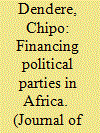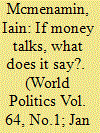|
|
|
Sort Order |
|
|
|
Items / Page
|
|
|
|
|
|
|
| Srl | Item |
| 1 |
ID:
180258


|
|
|
|
|
| Summary/Abstract |
What is the impact of access to political party finance – money that parties use to fund their campaign activities – on politics in Africa? While multiparty elections have become more regular in the developing world, many opposition parties are still failing to win elections. This paper argues that poor access to political finance weakens democratic consolidation and negatively impacts the participation of less-resourced candidates who are unable to self-fund. As a result, opposition parties are forced to rely on weak promises of aid from international donors and unreliable state funding. This in-depth analysis of political finance, based on extensive interviews with politicians and government officials in Zimbabwe, political documents, news reports and a review of court cases, reveals that uneven financing has weakened opposition parties and serves as an extra advantage for incumbents.
|
|
|
|
|
|
|
|
|
|
|
|
|
|
|
|
| 2 |
ID:
112509


|
|
|
|
|
| Publication |
2012.
|
| Summary/Abstract |
Do business contributions to political parties convey different messages in different countries, and, if so, why? This article presents a pioneering cross-national study of firm behavior in political finance. It argues that motivations for contributions to parties are either ideological or pragmatic. The author infers motivation by quantitatively relating the payments of 960 firms to various political parties in Australia, Canada, and Germany over periods of between seven and seventeen years. In coordinated market economy Germany, a small number of firms made ideological payments; in liberal market economy Australia and Canada, large numbers of firms made pragmatic payments. Australia's left-right party system creates an awareness of policy risk, which motivated ideological payments, but in Canada's unusually nonideological party system no ideological bias in business financing of politics was found. The statistical analysis is supplemented by a qualitative investigation of discrete and reciprocal exchanges between businesses and political parties.
|
|
|
|
|
|
|
|
|
|
|
|
|
|
|
|
| 3 |
ID:
141906


|
|
|
|
|
| Summary/Abstract |
This article compares the financing of political parties and candidates in two Southeast Asian countries. In Malaysia, some political finance regulations exist only on paper, and political financing is for the most part not restrained at all. In contrast, the financing of candidates and parties has always been tightly circumscribed in Singapore. These different strategies, “laissez-faire” versus “strict control,” are the consequence of various factors. In Malaysia, the New Economic Policy has effected a close, often economically unproductive linkage between the state, the ruling Barisan Nasional coalition, and business. The rise of businesspeople has resulted in the commercialization of competition within (the United Malays National Organisation. Additionally, increasing competition between the ruling coalition and the opposition has resulted in growing expenditures for electioneering in the form of advertisements and electoral patronage. The laissez-faire style of regulation has been compounded by the difficult-to-control practices in East Malaysia (Sabah and Sarawak), where vote buying, electoral patronage based on the largesse of oligarchs, and obvious nonobservance of the rules have been typical. In contrast to Malaysia as a whole, the costs for parties and candidates are still relatively low in Singapore. As a cadre party, the PAP (People's Action Party) is relatively autonomous from private business interests, and intraparty competition is not commercialized; the developmentalist state is highly productive, and the ties between the state, the PAP, and business are not characterized by cronyism. Moreover, electioneering is not very commercialized because the opposition is still relatively weak.
|
|
|
|
|
|
|
|
|
|
|
|
|
|
|
|
| 4 |
ID:
039025


|
|
|
|
|
| Publication |
Princeton, Princeton University Press, 1988.
|
| Description |
xvii, 253p.
|
| Standard Number |
0691077916
|
|
|
|
|
|
|
|
|
|
|
|
Copies: C:1/I:0,R:0,Q:0
Circulation
| Accession# | Call# | Current Location | Status | Policy | Location |
| 032317 | 321.8/BET 032317 | Main | On Shelf | General | |
|
|
|
|
| 5 |
ID:
141905


|
|
|
|
|
| Summary/Abstract |
The three articles in this themed collection investigate the interplay between political finance regimes and the quality of democracy in Southeast Asia. Andreas Ufen's piece on political finance in Malaysia and Singapore argues that the semi-authoritarian regimes in both states have blocked the reform of campaign and party funding regulations in order to keep their opposition in check. The article on Indonesia, authored by Marcus Mietzner, showcases the country's dysfunctional political finance system as a major hurdle toward further democratization. In their contribution on Thailand, Napisa Waitoolkiat and Paul Chambers show that weak political finance regulations have contributed significantly to the shallowness of Thai parties. Overall, the collection demonstrates that without meaningful political finance reforms, Southeast Asia's democratic stagnation is likely to persist for many years to come.
|
|
|
|
|
|
|
|
|
|
|
|
|
|
|
|
|
|
|
|
|